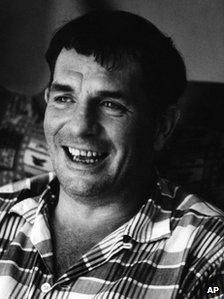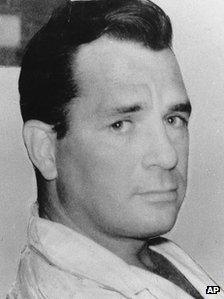Kerouac's 'lost' book published
- Published

Jack Kerouac found his overnight success hard to deal with
American author Jack Kerouac's first ever novel, which was thought to be lost, has been published 40 years after his death.
The American writer, who was hailed the king of the Beat generation and a hero to many young men, penned The Sea Is My Brother aged 20, based on his years as a merchant seaman.
It features correspondence with his best friend Sebastian Sampas and recalls his "life and experiences" at sea, says the book's editor Dawn Ward.
"This book is really quite important as it shows how Jack developed his writing process," she says.
"The letters that support this period, show that he and Sebastian were reading very important writers and playwrights of the time. They were paying attention to changes in literature styles and autobiographical works."
Ms Ward says the work is especially poignant as he "opens up and shows a side to him that we don't normally see in his books."
The manuscript, which was was discovered in the writer's archive by his brother-in-law, came as a surprise to Kerouac experts, Ms Ward says.
"It was referred to briefly in letters, but nothing that led anyone to believe that there was this really large volume."
Born in 1922, Kerouac began writing from an early age and took to carrying a notebook with him wherever he went, scribbling down notes and penning long, rambling letters to friends and family.
Before writing became his career, the author was a sports reporter, construction worker and joined the Navy twice.
It was not until 1950 when his first book, The Town And The City, was published.
Although the novel received positive reviews, sales of the book were not impressive and it took Kerouac a further six years before he was to get his next book printed.
On The Road, about a spontaneous road trip, was and still remains Kerouac's most influential and famous book.
Ms Ward says it is the "great rhythm, flair and openness" that continues to attract people to the novel.
At the time, critics sat up and took notice of the work, hailing Kerouac as the voice of the Beat Generation - a group of post-WWII writers including poet Allen Ginsberg and William S Burroughs, who rejected conformity and materialism in favour of free expression and experimentation with drugs and sexuality.
Writer and critic Stuart Evers on The Sea is My Brother
'Cult figure'
Kerouac famously penned the work in three weeks, on one large roll of paper, so he could avoid reloading a typewriter.
The defining work, which regularly features in must read lists, is now set to be made into a Hollywood movie with British actor Sam Riley in the main role of Sal Paradise, thought to be based on Kerouac himself.
Dr Ian McGuire, who teaches American literature at Manchester University, says Kerouac has become a "cult figure".
"Young students, particularly the males, have a perpetual fascination with what he represents.
"I think they find it very appealing, very romantic and very exciting, this idea of leaving home and travelling and discovering yourself and having all these adventures."
He says every year there are students who want to write about Kerouac and what he represented.

Jack Kerouac passed away in 1969 aged just 47
Dr McGuire says the writer's style was "deliberately free flowing and kind of formless".
"He was well known for just firing himself up on drugs and alcohol and writing and writing and writing. So there's a kind of free flowing stream of consciousness quality to it. It has a kind of excitement and energy to it which makes it continually interesting.
"But I think in pure literary terms his writing is pretty hit and miss. I think his fame rests on this rather romantic notion of freedom."
After the success of On The Road, Kerouac continued to write and had several more books published, including Visions of Cody, Visions of Gerard, Big Sur, and The Subterraneans.
However, he found coping with his new celebrity status difficult and he developed a drinking problem, which eventually killed him in 1969 aged just 47.
"Jack made a tremendous impact on American literature, not just as this cult figure, but also as this person who changed the rules," says Ms Ward.
"I think young people are still driven to his work because it is this exemplary of freedom."
- Published2 September 2010